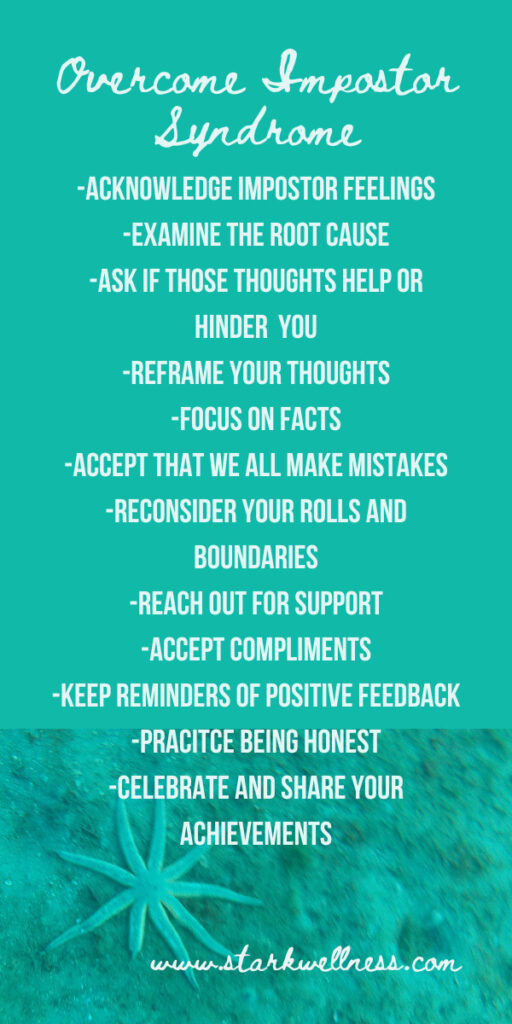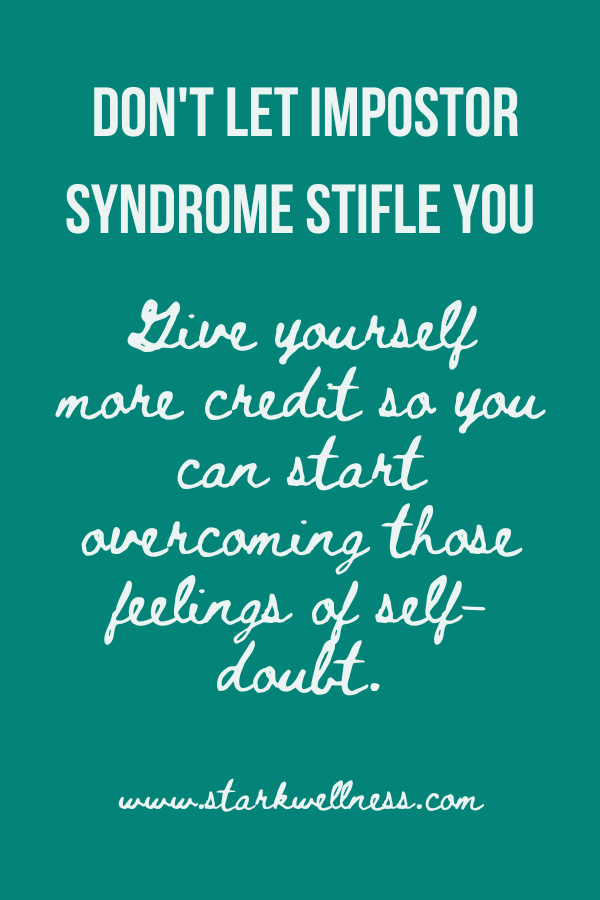Have you ever felt inadequate, like you don’t belong, or like everyone’s going to find out that you don’t really know what you’re doing or deserve your achievements?
If you can relate to those feelings of chronic self-doubt, you’ve probably experienced impostor syndrome.
You’re not alone – studies suggest most people experience imposter syndrome at some point. I have been in and out of that group myself.
Overall, impostor syndrome stems from a high sense of self-doubt. Does that term resonate with you? Do you relate with any of these common patterns?
If so, I’m here to help you overcome impostor syndrome.
Common Patterns of Impostor Syndrome
- Calling it luck. You downplay your success because you don’t believe you deserve it, you believe you just got lucky, or you fear you won’t be able to “pull it off” again.
- Disregarding yourself. Instead of celebrating your accomplishments, you deny your success. You don’t acknowledge your skills and abilities, and you worry that others will see “the truth” about you.
- Perfectionism. You set high goals for yourself and the smallest mistakes make you feel like a failure.
- Fear of failure. You avoid taking risks and instead tend to take on limited or less challenging tasks because you fear failure. Your fear might stem from your own beliefs and expectations or because of what you think others will think or say.
- Difficulty asking for help. You believe asking for help will show that you’re incompetent or unqualified. You think they’ll definitely see that you’re a “fraud”.
It’s good to check your work and continue learning and growing. There’s nothing wrong with wanting to do your best and maintaining a healthy balance of performance and self-checking.
But continuous self-doubt and feeling like an imposter can increase depression and anxiety and limit your confidence to go after new opportunities. It can also lead to burnout because you might keep yourself stuck in a job or life roll when you feel that you don’t deserve better.
Your relationships might suffer if you put up walls and avoid connection because you’re afraid of being “found out”. You might even be too quick to end relationships for this reason.
Has unhealthy self-doubt become stifling for you? Do you want to feel like you’re the real deal and reflect that in your daily life? Do you want to overcome impostor syndrome?
Here are some steps you can take to give yourself more credit and start overcoming those feelings of self-doubt.
[ Important note: If you’re working in a place in which you are being marginalized, discriminated against, or bullied into feeling like an imposter, please seek appropriate professional help within your institution. Also, if you are in a relationship with someone who is aggressive and making you feel unworthy, please seek help from a counseling professional as a couple or for yourself, or report your experiences to local authorities. This article is only meant to help you if you are experiencing excessive, unfounded self-doubt. ]

Steps to Overcome Impostor Syndrome
- Acknowledge impostor feelings. Recognize when those uncomfortable feelings come up for you. Instead of engaging with your thoughts of self-doubt, acknowledge that it’s a normal response and offer yourself compassion.
- Examine the root cause. Why do you think you feel like you don’t belong? Is it due to a fear of failure? Do you believe you are lacking a skill or trait? Are you setting extreme expectations? Where are those coming from? Do you believe that you don’t deserve success? Why or why not?
- Ask yourself if those thoughts help or hinder you. Does feeling fraudulent have any benefit? What kind of person do you want to be? Sometimes a little self-doubt can help us step up a little higher, but most often self-doubt holds us back.
- Reframe your thoughts. Give yourself more credit and enjoy that experience. Own your accomplishments instead of attributing them to “luck” or dismissing them because you got help. Rethink your impossibly high standards, and set realistic goals so you can enjoy the process. Remind yourself nothing will ever be “perfect.” Accept that we all have to start somewhere. Also, accept that our situations change; in a new setting we shouldn’t expect to perform the same as in a previous setting.
- Focus on facts. For example, you were chosen for your job because of your qualifications. Review those qualifications or pull out your resume. Another example might be focusing on your bullet points for a presentation you’re giving, the facts you’re presenting, or the step-by-step help you’re providing–it’s not really about you. And maybe you’re not a perfect mom, but someone acknowledged that you made a great parenting decision, and you can tell yourself, “Yes, in fact that was great.”
- Accept that it’s okay to make mistakes. Instead of fearing failure, develop a healthy response to making mistakes. Accept that it’s normal to make mistakes and learn from each mistake instead. Know that you can always recover, and when necessary you can repair most mistakes. By the way, it’s also okay not to accomplish everything you set out to do.
- Reconsider your rolls and boundaries. Have you developed a habit of always making yourself available and thus too frequently being called upon as the ‘go-to’ person? This can be stressful and lead to feeling like an imposter when you’re constantly worried about what might be asked of you and like you always have to be on your game. This may also lead you straight to burnout. You need breaks to rest and recharge your body, refresh your mental capacity, upgrade your skill sets when things start changing, recapture your love for your involvement.
- Reach out for support. Having a safe space to receive support will help you reduce feelings of being an imposter. Resist your instinct to hide. Instead, start reaching out to an encouraging friend, mentor, coach, or colleague for support. I know how vulnerable this feels, and I’m happy to support you.
- Say “thank you” when you receive a compliment. Let it soak in, too. Don’t add in a “luck” card or discount yourself–this discounts the person offering you the compliment as well. Are you saying they can’t recognize goodness or that they should not acknowledge what pleases them?
- Keep reminders of positive feedback and compliments you receive. Save emails, cards and letters you receive from others with compliments or positive feedback and write down such words you hear. Go through this collection when you need a reminder that you are skilled and worthy and that people see your value. Read them when you need a boost to tackle something scary. My scariest business endeavor was when I presented a wellness workshop for the entire Texas State Health Department–talk about intimidating, nerve-racking and impostor syndrome inducing. The feedback forms were full of so much gratefulness, positivity and encouragement. I’ve read those babies at least a dozen times. Positive reviews from past supervisors can serve this purpose as well as little random thank you notes from friends. They all show your overall goodness.
- Practice being honest when you feel imperfect, embarrassed, or have made a mistake. This is sooo hard, I know. When I make a mistake I want to sink away. Staying visible and present will give you opportunities to allow your humbleness to shine. You’ll start to realize that other people are a lot more forgiving than you think and a lot more concerned about their own experiences. When no one realizes a mistake you’ve made, you might still talk it out with that safe, supportive person you thought of in #7 just for practice and to boost your resiliency skills.
- Celebrate and share your achievements. Give yourself a strong pat on the back and let someone else join you in your triumphs. It will lift you both up! Think of how good you feel when someone you love finds success, especially when you know how difficult the task was. You wouldn’t let your best friend who works in real estate downplay making a sale because he “just got lucky.” Your success might motivate someone else to do their hard thing, too. If you’re afraid you might arouse jealousy….well, you’ve just gotta know your people. It can also be fun to join an online group for a particular field of work or for a goal you’re trying to achieve, a group where celebrations are highly welcomed. These groups welcome expressions of discouragement as well because members who have succeeded love helping others.

A Personal Story About How I Deal with Self-Doubt:
Leading meetings and hosting workshops has always produced great anxiety for me, as I mentioned above in #10. I’ve led hundreds of meetings and workshops in various educational, counseling, and fitness institutions. I used to be terrified about what questions might be asked, what information I might get jumbled as I speak, what data might slip my mind, what might reveal that I’m really an impostor and shouldn’t be teaching anyone anything….
Maybe you can relate?
Here is what I realized: As the presenter, because I have advanced knowledge on the subject, I can think of advanced questions that I have and couldn’t answer for others. But the attendees came for basic knowledge and asked questions about basic things; and if they did have advanced questions, I always found it okay to say “I don’t know, but I’ll find out.”
Now I actually find it relieving to let go of that belief that I must know it all. I enjoy the challenge of having to learn something new and the satisfaction of being able to get in touch again to share what I learned and see the recipient so thankful.
Sometimes someone else can step up to the plate and bask in the glory of saving the day with an answer, too. It doesn’t have to be me. I can be the presenter AND facilitator of others sharing their knowledge and experiences.
I hope that makes sense!
Impostor syndrome can make you feel like you’re not good enough, you don’t belong, or you’re undeserving. But it’s important to remember that learning and making mistakes do not make you a fraud. You’re human, you’re good enough, you belong, and you’re deserving!

Instead of doubting yourself, take these steps to build your self-esteem and self-worth. You deserve the freedom you’ll feel when you overcome impostor syndrome.
You may not ever completely stop feeling like an impostor, but these tips can help you tame those feelings and develop more self-compassion and resiliency.
If you need more help building self-esteem, get in touch with me today. I LOVE helping my clients realize their worthiness and boost their self-confidence, and I’ve got a good little guide to help you get started on your own self-esteem journey, too. Let me know if you want it.

Hi! I’m Jennifer, your life, love and wellness coach! I help men, women and couples figure out what’s keeping them from being happy and healthy so they can overcome those blocks and determine and implement steps to truly improve their lives, relationships, and physical and mental health. I’m a certified Professional Life Coach and Holistic Health Coach with a background in professional counseling. I’m ready to help you. jennifer@starkwellness.com
HDPE fittings says
Nice blog here! Also your site loads up fast! What host are you using? Can I get your affiliate link to your host? I wish my web site loaded up as quickly as yours lol
admin says
Hi. I’m glad you’re enjoying the Stark Wellness blog. Thanks for your compliments! I use Blue Host for hosting, but I am not an affiliate. Honestly, I’m not so sure they are the best, and optimizing your website is the best place to start, rather than changing hosts. Happy to help you out if you want to send me an email.